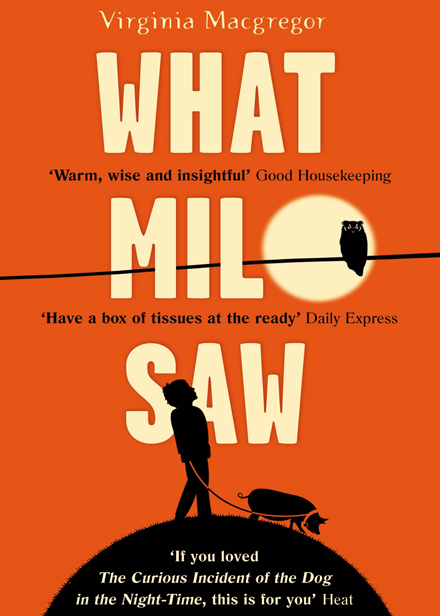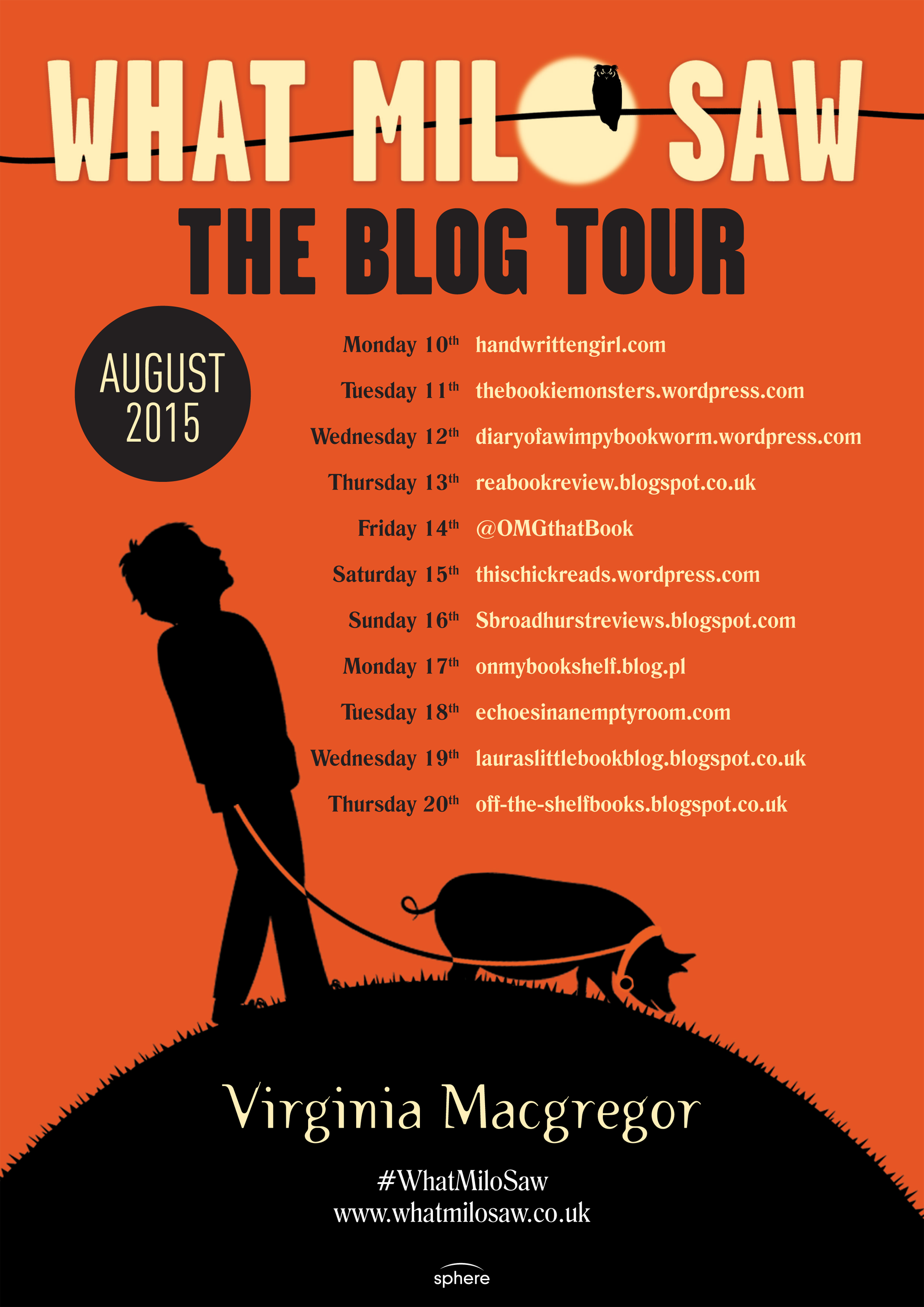What Milo Saw Book Tour
 Today I am delighted to be kicking off the book tour for one of my favourite debuts of 2014, ‘What Milo Saw’. The author of the book Virginia MacGregor tells us what is the book that she wishes she had written as well as an extract from ‘What Milo Saw’ for you to enjoy.
Today I am delighted to be kicking off the book tour for one of my favourite debuts of 2014, ‘What Milo Saw’. The author of the book Virginia MacGregor tells us what is the book that she wishes she had written as well as an extract from ‘What Milo Saw’ for you to enjoy.
The Book I Wish I’d Written By Virginia Macgregor
The novel/biography etc. that you hold up as a true triumph and really, really wish you’d written
The book I wish I’d written is a novel that has it all: characters who feel more real than the flesh and blood people around me; a gripping story that never lulls, despite its length; an original and vivid setting; a timeless, universal story of Shakespearean stature; and language that is original and effortless. I’m sure that I’m not the only writer with a deep envy for Barbara Kingsolver’s The Poisonwood Bible.
I love reading and writing novels with multiple-narrators. Kingsolver gives us the voices of five characters, all women, who accompany their father and husband, a Baptist missionary, to the Congo in 1959. It is telling that although Nathan Price is not given a point of view, his sermonising, superior voice nevertheless booms through the novel. It is also ironic that through the monologues of his wife and daughters, it is he who is put on trial for dragging his family from their comfortable home in America to a wild, unforgiving continent, which does not seem to want or need the help of their grimly idealistic father.
I love the teenagerishness of the daughters: their moans and mannerisms, their materialism, their struggles to adapt – in particular Rachel, the eldest, who is waking up to her father’s inadequacy and the absurdity of the adult world. She is foiled beautifully by her goody-two-shoes sister, Leah and by Leah’s twin, Adah, who suffers from hemiplegia. Adah can barely speak but her linguistic insights are the most profound of all. As I discovered when writing What Milo Saw, children with disabilities have a huge capacity for compensation – and brilliance. Perhaps most touching is five-year-old Ruth May, who reminds me of Willa in the novel I am writing at the moment. Giving young children their own voice harks back to Dickens: he understood how a little person’s quirky view of the world can breathe life into a narrative. And then there is Orelanna, the mother, who is torn between her loyalty to her tragically flawed husband and a deeper wisdom that warns her that all is not well with her family and their new life.
It is no accident that Kingsolver herself bellyached about writing this book: ‘I did not believe I would ever be writer enough to do it.’ She worried about her skill and about her knowledge of her subject. And then her husband (husbands have a lot to answer for…) said: “Really, you’re scared. You know enough to begin this novel, so just write.” And so she started, ‘the huge novel I wished I could write.’ She dared to write big. That lesson stays with me, as does her wonderful story.
Now sit back and relax and enjoy an extract from ‘What Milo Saw’
EXTRACT
[amazon_link id=”0751554278″ target=”_blank” ] [/amazon_link]Milo sat at the computer on the landing listening to the shush-shushing of the firemen’s hose on the drive. The firemen had only just let them back into the house.
[/amazon_link]Milo sat at the computer on the landing listening to the shush-shushing of the firemen’s hose on the drive. The firemen had only just let them back into the house.
‘I want a list of nursing homes,’ said Mum.
‘Can’t Gran stay till Christmas?’
Gran was Dad’s gran and Milo’s great-gran but everyone just called her Gran.
Milo turned his head to look at the fairy lights he’d wound round the banisters leading up to Gran’s room. He’d had the idea when he saw her struggling to find the light switch.
Mum guided Milo’s head back to look at her and said ‘No.’
‘But . . . ’
‘Don’t insist,’ said Mum and then pinched shut her mouth.
Don’t insist was Mum’s favourite phrase of all time.
‘But Mum – the fire was my fault, I should have gone down to check.’
And it was true. Every morning when Gran padded down the stairs from her room under the roof all the way to the kitchen and made her cup of sweet, milky tea, it was Milo’s job to make sure she was okay. He’d lie in bed and listen for the clues:
1. The clink of Gran’s tartan mug as she pulled it off the mug tree.
2. The suck and pop of the jar with the tea bags.
3. The rattle of the cutlery drawer as she took out her favourite teaspoon, the one made of real silver with a kink in its handle.
4. The kettle filling up (though usually Milo tried to remember to fill it up the night before because
Gran’s wrists were weak and she struggled to hold the weight of so much water).
5. The click of the switch on the kettle.
6. A pause.
7. And then the water heating, steam pushing at the lid, bubbles rolling over each other like a hot sea, and then another click when it was done.
8. Sometimes, after step 3, Gran forgot they had a kettle and she’d open the saucepan drawer and fill a pan up and light the stove. That was the cue for Milo to swing his legs out of bed and come downstairs. They had a gas hob and Gran wasn’t allowed to use it. Milo didn’t know why he missed the sound of the saucepan drawer that day. He must have been sleepy or maybe Gran was extra quiet, but by the time he felt the flutter in his chest which told him that Gran needed him, and by the time Hamlet was squealing his head off in the garage because he’d swallowed too much smoke, it was too late, the kitchen was on fire.
‘It’s not your responsibility to check on your gran,’ said Mum.
She leant in and kissed Milo’s hair. She was always doing that: telling him off and then kissing him. She smelt of burnt things and sticky perfume and sleep.
‘When all this is over, I’ll let Hamlet stay in the house,’ she said.
Milo leant under the desk and gave Hamlet a rub between his ears. The only reason he was allowed up here now was because the fire had scared him. Milo hated the fact that Hamlet had to live in the garage all by himself: the garage was cold and damp and didn’t have any windows. No one should live like that. But if Milo had to choose between Hamlet coming out of the garage or Gran getting to stay with them, he’d have to pick Gran. Hamlet would understand. Mum looked over Milo’s shoulder at the computer screen.
‘We don’t want anywhere fancy, Milo, Gran wouldn’t like that.’
So Milo tried typing not fancy nursing homes into Google but Google didn’t get it and wrote back: did you mean fancy nursing homes?
Once Milo had stationed Gran safely on the drive and once he’d yanked open the main door to the garage and got Hamlet out of his cage and given him to Gran to look after, he’d come back inside and screamed: Fire! Fire! Mum! There’s a fire!
Mum had come tearing down the stairs and out of the house, her non-make-up face all pale and puffy. When she saw Gran she didn’t ask how she was and she didn’t say she was relieved that Hamlet was safely out of the garage and she didn’t tell Milo well done for having saved everyone. She just yelled the same words over and over: This is the last straw. This is the last bloody straw.
Milo and Gran both knew what the last bloody straw meant: it meant that Gran was going to a nursing home. Mum jabbed a chipped pink nail at the computer screen.
‘Those rooms are far too big,’ she said. ‘Gran will feel lost.’
So Milo did a search for nursing homes with small rooms. But then he thought about all the stuff Gran had upstairs, like Great-Gramps’s bagpipes and his uniform and the boxes of letters he’d written her and her map of Inverary and the picture of her fishing boat and her small radio and how she’d want to take it all with her.
‘It’s not coming up with anything.’ If Milo made Mum feel it was a hassle, maybe she’d back down.
‘Oh, for goodness sake, Milo.’ Mum looked up the stairs to Gran’s room and scratched a red bit on her throat. Then she leant in and whispered, ‘Just find somewhere cheap.’
Mum wrote the word CHEAP on the back of an envelope and placed it right in front of Milo so it wasn’t lost in the fuzzy bit of his vision. He ran his fingers over the word; she’d pressed so hard on the pencil that the letters felt bumpy.
‘I’ve got to make the firemen some tea.’
Still in her nightie (the frilly one that looked like the kitchen curtains, or how they looked before they caught fire and turned into black moths on the linoleum floor), Mum rushed back downstairs. Milo heard the cupboard door open and the rustle of the Hobnobs packet. The plastic kettle had melted, so Milo didn’t know how Mum was going to boil water for the tea.
Milo wasn’t going to let Mum stick Gran in a nursing home. He’d pretend to go along with it and then Mum would calm down and realise that Gran belonged right here in the small room Dad had converted for her under the roof, and that Milo was the best person to look after her. Then
they’d have a proper Christmas, the four of them: Milo, Gran, Hamlet and Mum. Milo scanned down the list of homes on the screen. They all had garden centre names like Acorn Cottage and
Birdgrove and Beechcroft Hill and Bird Poo View. He made up the last one.
Milo typed: not cheap nursing homes into Google and waited for a new page to load.
‘Found anything yet?’ Mum called up the stairs.
The burnt smell had crept into the carpet and curtains and walls and was making the back of Milo’s throat tickle.
He coughed and called back: ‘Nearly!’
‘Well, when you have, give me the phone numbers and I’ll organise some visits.’
Milo didn’t answer.
Above him, the floorboards creaked and then water juddered through the pipes. He hoped Gran would remember to turn off the tap. As soon as he’d finished making this stupid list, he’d go up and tell Gran that there was no way he was going to let Mum kick her out. He’d work out a plan that guaranteed she could stay, and not just for Christmas.
Now that you have read a taster from the book, why not play ‘What Milo Saw’ game, it is essentially a guessing game and was created to help support awareness of Retinitis Pigmentosa, the condition which Milo suffers from. ‘What Milo Saw’ will see players having to focus on the detail of an image as if seen through a moving pinhole to find out how observant they are. Booksellers, bloggers and book lovers will be encouraged to play with incentives to share high scores on social media, with the chance to win £250 John Lewis vouchers in addition to What Milo Saw goodies.
The competition is officially launched on Friday 31st July, and is open until Friday 4th September. The overall winner will be announced on www.facebook.com/TheLittleBookCafe and @littlebookcafe the week commencing 7th September.
Play and share the game at: www.whatmilosaw.co.uk
You can buy [amazon_link id=”0751554278″ target=”_blank” ]What Milo Saw from Amazon [/amazon_link] and is available to buy from good bookshops.
If you enjoyed today’s stop on the tour, then check out the poster below and follow the tour.

Leave a Reply